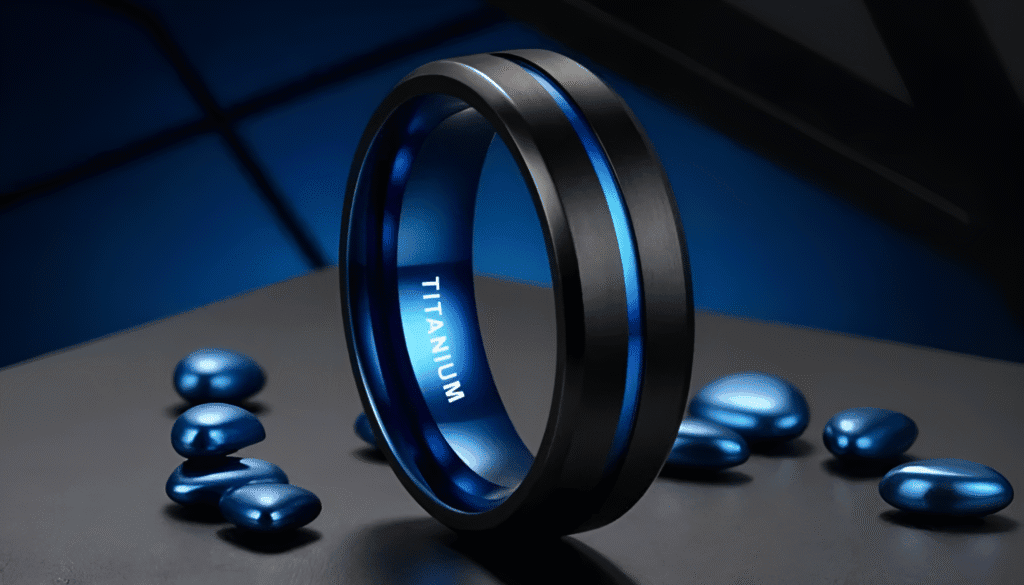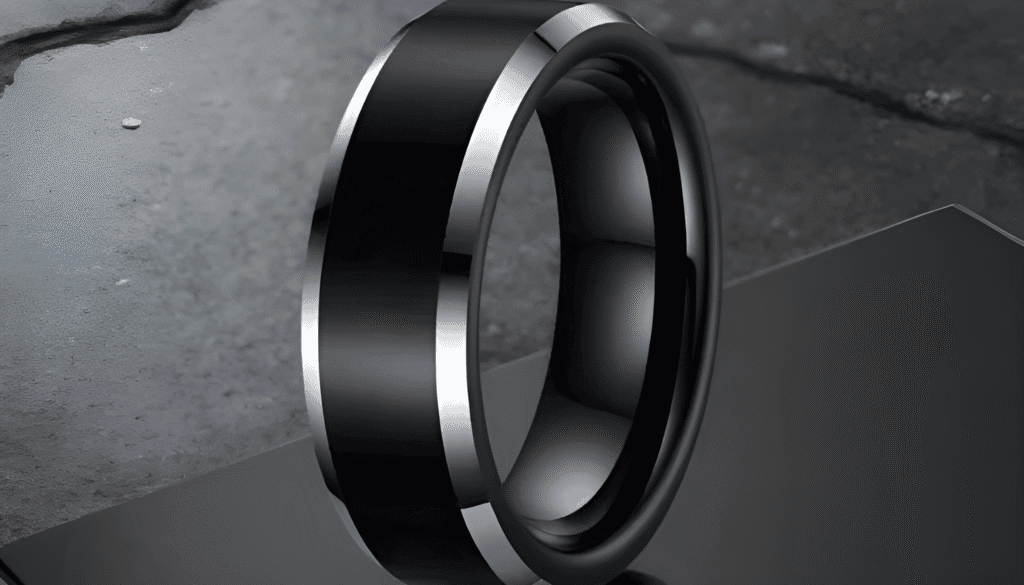Can You Wear Titanium Rings in the Shower? What You Need to Know

Yes, you can confidently wear a titanium ring in the shower. Thanks to its naturally rustproof and corrosion-resistant properties, titanium handles daily water exposure with ease, making it a reliable choice for active lifestyles.
Just steer clear of harsh chemicals like chlorine, especially if your ring has a coloured or plated finish. With a quick rinse and occasional polish, it’ll keep its shine for years. You can explore our bestselling styles in the men’s titanium ring collection, which includes free UK delivery, returns, and a 1-year guarantee.
Is It Safe to Shower with a Titanium Ring? (Everything You Need to Know)
When choosing a men’s wedding ring, it’s not just about looks; it’s about how well it performs in daily life. Showers, workouts, and even post-gym rinses are all part of the routine. That’s where titanium shines.
Known for its exceptional strength, corrosion resistance, and lightweight feel, titanium isn’t just used in aerospace and medical tools; it’s become a go-to material for active men seeking rings that hold up in wet, high-impact environments.
So, can you shower with a titanium ring? In short: yes. Pure titanium is rust-proof and non-reactive with water, meaning everyday exposure to showers, tap water, or even sweat won’t cause it to tarnish or corrode.
“Titanium rings… are biocompatible (hypoallergenic), lightweight, corrosion‑resistant, and have the highest strength‑to‑weight ratio of any crystalline metal. It is highly resistant to most causes of corrosion, including sea water, aqua regia, chlorine (in water), and some acids” Wikipedia
That’s one reason it’s featured in our Men’s Titanium Rings collection, built for durability and everyday wear. However, if your titanium ring is anodised (coloured), or contains glued elements or inlays, some extra care is needed, especially around chlorinated pools or harsh chemicals.
For more on water-safe jewellery materials, check out Are Silicone Rings Waterproof?. Or browse our full Men’s Ring Collection for designs made to go wherever you do, from the office to the outdoors.
Pros and Cons of Titanium Rings: Quick Comparison
Titanium rings have surged in popularity among men who want something sleek, tough, and meaningful, without the price tag or weight of traditional precious metals.
But like any material, titanium has both strengths and limitations. Here’s a clear-eyed look at the pros and cons, so you can decide if a titanium wedding or fashion ring fits your lifestyle.
Pros | Cons |
Extremely Durable Resists scratches, dents, and bending better than silver or gold. | Difficult to Resize Titanium’s strength makes resizing tricky or sometimes impossible. |
Rust & Corrosion-Resistant Safe in water, sweat, and everyday exposure. | Matte Finish Lacks the glossy shine of gold or polished metals. |
Lightweight & Comfortable Perfect for daily wear, even for first-time ring wearers. | Fewer Finish Options High-polish versions are harder to find than other metals. |
Hypoallergenic Ideal for sensitive skin or metal allergy | Coloured Coatings May Fade Anodised colours can wear over time with chemical exposure. |
Affordable Luxury Offers high quality without the high price tag |
How Titanium Rings React to Water, Showers & Daily Wear
If you’re wondering whether your titanium ring can handle everyday exposure to water, from daily showers and handwashing to the occasional dip in a pool, the short answer is a confident yes.
Titanium is one of the rare metals that’s naturally inert, meaning it won’t react with water or oxygen. Thanks to its ultra-durable oxide layer, titanium rings are resistant to rust, corrosion, and discolouration.
That’s exactly why it’s used in everything from aerospace parts to medical implants, and why it’s one of the best choices for shower-safe men’s rings today.
Unlike lower-grade metals, titanium won’t lose its finish, warp, or flake after exposure to soap or hot water.
For men with active lifestyles, whether that’s daily gym sessions, construction work, or fatherhood, titanium rings offer a no-fuss, long-term solution that can be worn all day, every day. If you’re looking for a waterproof alternative to a gold ring, titanium delivers on both function and style.
That said, not all titanium rings are created equally. If your ring is anodised (coloured) or features glued-in inlays like wood or carbon fibre, it’s worth being a little more cautious. Harsh chemicals found in chlorinated pools, saltwater, or abrasive cleaning agents may cause fading or weaken the bonding agents.
In those cases, it’s best to remove your ring before swimming or heavy cleaning, or give it a rinse with fresh water afterward. You’ll help preserve the integrity and look of the ring for years.
Pro Tip: A pure titanium band (especially brushed or polished finishes) can be safely worn in the shower without concern. No rust. No odour. No discolouration. It’s the reason many men opt for titanium over softer materials and why it remains a trusted favourite in our Men’s Rings Collection.
If you’re deciding between metals, you might also want to explore how titanium compares to tungsten or learn why titanium is ideal for men’s wedding rings in real-world situations.
Looking for a titanium ring that handles sweat, soap, and splash with ease?
Explore our full Titanium Rings Collection featuring lightweight, waterproof, and hypoallergenic designs.
Will Titanium Turn Your Finger Green?
No, titanium rings will not turn your finger green. They’re one of the safest options available for everyday wear. Titanium is a hypoallergenic metal, meaning it doesn’t contain reactive elements like nickel or copper, the usual culprits behind green stains or skin irritation.
So, if your skin is sensitive or you’ve had bad experiences with cheaper jewellery in the past, titanium is an excellent alternative that won’t let you down.
Green staining typically occurs when rings made from brass, copper, or low-grade alloys react with moisture, sweat, or acidic soaps. These metals oxidise over time, creating that green residue on the skin.
Titanium, by contrast, is completely inert. It forms a natural oxide layer that protects it from rusting, corroding, or reacting with your skin, even if you wear it in the shower or while exercising. That’s why it’s the same metal used in surgical implants and aerospace parts; it’s built to last.
So, if you’re asking, “Is titanium safe for sensitive skin?”, the answer is a confident yes. Men with skin allergies or high sensitivity often choose titanium rings because of their reliability, purity, and long-term comfort.
“Titanium … is the metal of choice for prosthetics, internal fixation, inner body devices, and instrumentation. … Its composition is nickel‑free, and very few long‑term allergies and other complications have been reported.” Wikipedia
And while some lower-cost rings on the market may be labelled as “titanium,” they might only be coated or alloyed with other metals that can still cause skin reactions.
That’s why it’s important to choose a high-quality, pure titanium ring from a reputable source like Newman Bands, where material integrity and wearer comfort are guaranteed.
If you’re looking for something just as skin-safe but even more flexible, our Men’s Silicone Rings are another brilliant non-metal alternative ideal for electricians, gym-goers, and active lifestyles.
Want a ring that lasts without staining or discomfort? Shop the full Titanium Rings Collection built for all-day comfort, shower-safe durability, and backed by free 1–2 day UK delivery.
How to Clean a Titanium Ring (Safely, Simply, and Effectively)
Titanium rings are known for their strength, corrosion resistance, and low-maintenance nature. But like all jewellery, they benefit from a bit of regular care.
The good news? Cleaning a titanium ring is incredibly simple; you don’t need ultrasonic machines or jewellery polishers. A quick clean at home keeps it looking sharp, polished, and worthy of everyday wear.
Whether you’ve got a classic brushed titanium band or a coloured design with inlays, here’s exactly how to keep your ring in top shape.
Step-by-Step: How to Clean Your Titanium Ring
1. Lukewarm Water
Start by filling a small bowl with lukewarm water. Avoid using hot water, which can weaken any adhesives used in plated or inlay designs. Lukewarm water is gentle enough to protect finishes while still loosening dirt and oil.
2. Mild, Detergent-Free Soap
Add a few drops of gentle, fragrance-free dish soap or hand soap to the water. Avoid anything with harsh chemicals, antibacterial agents, or strong acids; these can discolour or dry out certain coatings, especially on anodised (coloured) titanium.
Silicone-based hand soaps or gentle natural products are ideal. Soaps with exfoliating grains or beads should be avoided, as they can scratch or dull the surface over time.
3. A Soft Cloth or Toothbrush
Use a soft microfiber cloth or a clean, soft-bristled toothbrush to scrub the ring gently. Pay attention to the underside of the band, where soap, sweat, and lotion residue can build up. For textured rings, a toothbrush helps reach inside grooves or engraved areas without scratching the metal.
Be careful if your ring features an inlay, plating, or glued design such as wood, carbon fibre, or abalone shell, as these may be more delicate. Stick to light pressure and avoid soaking for too long.
What to Avoid When Cleaning Titanium Rings
Even though titanium is one of the most durable materials used in men’s wedding rings, that doesn’t mean it’s immune to wear from poor care. Here’s exactly what you should avoid to keep your titanium ring looking its best:
• Avoid Abrasive Materials
Using abrasive tools like steel wool, scouring pads, or baking soda can leave fine scratches on your ring’s surface, especially if it has a brushed or matte finish. These scratches may not be immediately obvious, but over time, they can dull the ring’s appearance. Stick to microfibre cloths or soft toothbrushes instead.
• Don’t Use Harsh Jewellery Cleaners
Many jewellery cleaners are designed for gold, silver, or diamonds, and those solutions can be too harsh for titanium. They often contain ammonia, alcohol, or acids, which can damage anodised finishes or break down adhesives in rings with inlays (such as carbon fibre or wood). To protect your ring’s finish, use only gentle, detergent-free soap.
• Steer Clear of Acidic or Alkaline Household Products
Avoid cleaning your titanium ring with things like vinegar, lemon juice, bleach, or bathroom cleaners. These highly acidic or alkaline substances can strip away the ring’s natural protective oxide layer. They also pose a risk to coloured titanium rings and can weaken glued seams in mixed-material bands.
• Don’t Skip Drying
After cleaning, always dry your titanium ring thoroughly. Leaving moisture trapped under the ring, especially if it has inlays or engraved details, can cause build-up or loosen materials. Use a clean, soft towel to gently dry both the ring and your finger after exposure to water.
• Avoid Ultrasonic Cleaners (Unless Safe for Titanium)
While ultrasonic cleaners are popular for metal jewellery, they can cause vibration damage to bonded parts or disrupt coloured finishes. If your titanium ring features unique inlays or coatings, ultrasonic cleaning may do more harm than good.
Learn about more scratch-resistant options: How Titanium Compares to Tungsten Rings
What About Polishing Your Titanium Ring?
Titanium rings are known for their matte or brushed finishes, which many men prefer for their understated, masculine appeal. But even titanium benefits from occasional polishing to maintain its clean, bold look, especially if it’s been exposed to everyday wear.
Here’s what you need to know about polishing titanium rings safely:
• Use a Non-Abrasive Polishing Cloth
The safest way to polish your titanium ring is with a non-abrasive jewellery polishing cloth, like a microfiber or soft chamois cloth. These are specifically designed to lift minor residue and restore lustre without scratching the surface. A gentle circular motion is all you need to bring back a subtle shine, no excessive pressure or harsh rubbing required.
Pro Tip: Skip the paper towels. They may feel soft, but their fibrous texture can still cause micro-scratches over time.
• Polishing Can Restore, But Not Resurface
It’s important to understand that polishing helps refresh your ring’s surface, but it won’t remove deep scuffs or scratches, especially if they’ve dulled the finish significantly. Titanium rings are incredibly hard and scratch-resistant, but not invincible. If your ring has visible wear, a professional jeweller may be able to buff or refinish the surface, particularly on anodised or brushed finishes.
• Avoid Metal Polishes Made for Silver or Gold
Avoid using commercial metal polishes intended for softer metals like gold, silver, or brass. These products often contain chemicals or micro-abrasives that can damage the ring’s oxide layer or affect colour finishes. Titanium doesn’t need those treatments, all it needs is a gentle cloth and warm, soapy water most of the time.
• Coloured Titanium Rings Require Extra Care
If you own a coloured or anodised titanium ring, be even more cautious. These finishes are applied through electrochemical processes and are more delicate than the raw metal itself. Over-polishing can wear down the coloured layer and expose the base metal beneath.
To preserve coloured titanium, avoid polishing altogether and instead stick to gentle cleaning only. If the finish does wear over time, you may be able to have it re-anodised by a specialist jeweller.
Want a ring that stays sharp with minimal upkeep? Explore our Men’s Titanium Rings Collection crafted for real-life durability and comfort.
Do Titanium Rings Fade If They Are Coloured?
Titanium rings in their natural form, typically a sleek silver-grey, are incredibly stable and retain their appearance over time. But when you opt for a coloured titanium ring, things work a little differently.
Coloured titanium rings are created through anodising, a chemical process that changes the surface of the metal without using dyes or coatings. This method gives titanium its vibrant shades from electric blue and gunmetal grey to bold bronze or even gold-like hues. While the results are stunning, they require a little extra care.
Coloured Titanium Rings Can Fade — But Only with Neglect
If your ring is anodised titanium, the colour isn’t painted on; it’s achieved through a light-interference process that changes how the metal reflects light. This layer is durable, but not permanent. With repeated exposure to abrasive surfaces, harsh chemicals, or rough handling, the anodised layer can fade or become dull.
Regular polishing or buffing, especially with metal polishes or abrasives, can strip the colour over time. That’s why coloured titanium rings need gentle care, not forceful scrubbing.
How to Preserve Your Ring’s Vibrant Colour
To keep your coloured titanium ring looking as bold as the day you got it:
- Avoid chlorine and saltwater, especially in pools or hot tubs.
- Remove your ring before applying lotions, hand sanitisers, or household cleaners.
- Store it separately from harder metals or rough objects that could cause surface wear.
Cleaning should be limited to a soft cloth and mild soap in warm water, no jewellery dips, ultrasonic cleaners, or abrasive cloths.
Is It Permanent? Not Quite — But It Can Be Restored
If your anodised finish starts to fade, it doesn’t mean the ring is ruined. In many cases, a professional jeweller can re-anodise the titanium and restore its colour. The base metal beneath remains intact; it’s only the surface layer that needs refreshing.
Prefer a colour that doesn’t fade? Consider natural titanium rings or rings that combine titanium with inlays of wood, carbon fibre, or coloured resins that maintain their look longer under pressure.
Browse our Titanium Rings Collection, including sleek natural finishes and modern colour options built to last.
Conclusion
Titanium rings are among the best choices if you’re looking for a shower-safe ring that won’t lose its strength or shine. Pure titanium is naturally resistant to rust, corrosion, and discolouration, making it perfectly safe for daily wear even in hot showers or steamy bathrooms.
However, if your ring includes plated colour, glued inlays, or anodised finishes, it’s worth removing it before long exposure to pool water, saunas, or chemical-heavy soaps. These elements can wear down coatings or adhesives over time, especially in titanium rings with multi-material designs.
For most rings in our collection, a simple rinse in clean water followed by gentle drying is all the maintenance you need. Titanium’s low-maintenance durability is one of the many reasons it’s become a modern favourite, whether for a wedding band, promise ring, or daily accessory.
Frequently Asked Questions (FAQs)
Yes, high-quality titanium rings are completely shower-safe. Titanium is non-reactive and doesn’t rust or tarnish in fresh water. Whether you’re rinsing off after the gym or taking a hot soak, your ring will retain its shine and structure.
Just be cautious if your ring is plated or has glued-inlays, as chemicals or prolonged exposure to harsh soaps may affect them.
Learn about scratch-resistant men’s rings
No, pure titanium is hypoallergenic and won’t stain your skin or cause irritation. If your ring is made with 99% or greater titanium purity, it won’t react with sweat or moisture. Discolouration may only occur with lower-grade metals or cheap alloy blends, so always buy from a trusted source.
Why titanium is ideal for men’s wedding rings
Cleaning your titanium ring is simple: use warm water, a mild soap, and a soft cloth. Gently rub the ring to remove any soap residue or buildup, then rinse and pat dry. Avoid abrasive scrubbers or harsh chemicals to preserve the finish, especially if your ring is anodised or plated.
Yes, but only for coloured or anodised titanium rings. These finishes can wear over time, especially with frequent exposure to harsh chemicals or abrasion. The good news? Natural titanium rings (silver-grey) do not fade and can last a lifetime with minimal maintenance.
A pure titanium ring can last a lifetime. It’s one of the most durable, lightweight, and corrosion-resistant metals available, trusted in aerospace, medical implants, and now men’s wedding jewellery. As long as you follow basic care (avoid chlorine pools, remove during heavy-duty work), your ring will stay in top form for years to come.

About the Author
This article was written by the team at Newman Bands, specialists in men’s rings with over a decade of experience supplying durable, stylish, and meaningful accessories.
Drawing from thousands of customer reviews and material wear tests, we offer evidence-based guidance to help you choose a ring that fits your life and lasts.
We’re proud to be backed by 10,000+ five-star reviews across the UK, and every piece we craft is built for real-world wear, whether at work, the gym, or walking down the aisle.






